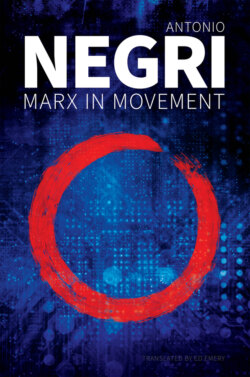Marx in Movement

Реклама. ООО «ЛитРес», ИНН: 7719571260.
Оглавление
Antonio Negri. Marx in Movement
CONTENTS
Guide
Pages
Marx in Movement. Operaismo in Context
Introduction Marx in operaismo, a Long Road
1 Archaeology and Project* The Mass Worker and the Social Worker. 1 Functions and limitations of the concept of the mass worker
2 Capitalist restructuring: From the mass worker to social labour power
3 Towards a critique of the political economy of the mass worker: From social labour power to the social worker
4 A political conception of labour power: The proletariat: Some problems
Notes
2 On Recent Trends in the Communist Theory of the State* A Critical Review. 1 The revisionist tradition and the conception of the state
2 Situating the problem: Marxian approaches
3 The current state of theory: The neo-Gramscian variant
4 Restating the problem: From distribution to production
5 Developments in the structural analysis of the state: The organizational mechanisms
6 Developments in the structural analysis of the state: The state in crisis theory
7 An aside: Quibbles, allusions and self-criticism of bourgeois theory
8 Restatements of the problem: State, class struggle and communist transition
Notes
3 Labour Value* Crisis and Problems of Reconstruction in Postmodernity
Notes
4 Marx and Labour* The Path to Disutopia
1 Act One. 1.1
1.2
1.3
2 Intermezzo
3 Act Two. 3.1
3.2
3.3
4 The history of an interpretation and of its developments
5 The Capital–Labour Relationship in Cognitive Capitalism*Antonio Negri and Carlo Vercellone
1 From the mass worker to the hegemony of cognitive labour
2 The main characteristics of the new capital–labour relationship
2.1 The overturning of the relationship between living and dead labour and between factory and society
2.2 Cognitive division of labour, working class, and destabilization of the canonical terms of the wage relation
3 The crisis of the threefold formula: The rent economy and the privatization of the common
6 The Organic Composition of Capital Today*
Notes
7 General Intellect and the Social Individual in Marx’s Grundrisse* 1
2
2.1
2.2
2.3
3
3.1
3.2
3.3
4
4.1
4.2
4.3
5
5.1
5.2
5.3
6
6.1
6.2
Notes
8 Operai e capitale Fifty Years On* What Has Happened in the Working Class since Marx?
What has happened in the working class since Marx?
Dear comrades
Notes
9 On Tronti’s Autonomy of the Political*
Notes
10 Post-operaismo?* No, Just operaismo!
POLITY END USER LICENSE AGREEMENT
Отрывок из книги
Antonio Negri
Translated by Ed Emery
.....
So our project is to resolve this fundamental ambiguity in the relationship that labour power (whether posited as individual commodity or as socialized abstract labour) has with class consciousness and with capital. In other words, at this point we have to ask ourselves whether the linear mechanism of Marx’s analysis, which locates the socialization and the abstraction of labour within the process of real subsumption of labour under capital, is not perhaps incorrect. The process of real subsumption, in Marx, concludes in a real and proper Aufhebung: the antagonism is transcended via an image of communism that is the necessary outcome of the dialectical process developed up to that point. In the more banal of the socialist vulgates, the Aufhebung – whose schema, in Marx, is conceptual, structural and synchronic – becomes diachronic, utopian and eschatological. To further clarify this point, I shall spell out my thesis: at the level of real subsumption (i.e. at the level of the complete socialization and abstraction of all the productive and reproductive segments of labour), we are dealing not with linearity and catastrophe, but with separation and antagonism. It seems to me that proof of this theory is to be sought first and foremost from empirical analysis (historical, sociological and political) of the movements of the working class, in other words from considering the characteristics of labour power when posited as social labour power.
Concretely, our argument could proceed from the examination of a familiar historical conjuncture: if, as some authors have done, we construct historical charts that map developments in the quality of work, then we can see how the entire direction of capitalist development is towards the destruction of skilled labour (of specific ‘skill’), reducing it to abstract labour (the multilateral ‘job’). The socialization of educational processes (schooling, skill training, apprenticeships) goes hand in hand with the process of the abstraction of labour, within a historical series of episodes that span the entire period since the Industrial Revolution. Within this time span, the tendency is progressive and broadly balanced, beginning from the eighteenth century and moving through to the 1920s–1930s: but at this point a break takes place in the balanced continuity of the historical series. The collapse of ‘skilled work’ can be located precisely in the period between the two big imperialist wars – that is, in the 1920s and 1930s. This resulted in the hegemony, as from that period, of the semi-skilled worker, the ouvrier spécialisé (OS) – what we call the mass worker. But it also turns out that this hegemony is transitory because the mass worker is in fact just the first figure in the collapse of the balanced relationship between ‘skill’ and ‘job’; the mass worker is the first moment of an extraordinary acceleration towards a complete abstraction of labour power. The mass worker, the semi-skilled worker (whatever his subjective consciousness) is not so much the final figure of the skilled worker, but rather the first impetuous prefiguration of the completely socialized worker.
.....